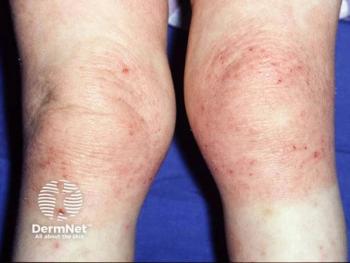
Quality of Life for Patients With Atopic Dermatitis
Trinity Flint comments on the burden of atopic dermatitis, highlighting its impact on her social life as a child and teen.
Episodes in this series

Diego Ruiz Dasilva, MD, FAAD: I’m curious about the quality-of-life burden that atopic dermatitis had for you. You mentioned it was bothering you in school and with your social life. What are some of the experiences you had trying to be a normal child with itchy skin and rashes that were visible?
Trinity Flint: Forchildren, it makes sense to not know what that is. But I was also a child explaining to grown adults that I wasn’t contagious and that if you’re near me, you’re not going to wake up with a rash tomorrow. That was hard for me to comprehend as a child. Children are mean in high school and middle school—all of them. If they don’t know what something is, they’re going to assume the worst. I’ve had individuals think that I have HIV. I’m thinking, “How could you have gotten that?” You get used to it, but it’s definitely not fun to experience throughout life.
It made me very insecure about the clothes I would wear outside the house because I didn’t want my skin and rashes to be visible. Later in life, that became way harder to do. My atopic dermatitis was isolated when I was a child, appearing only on my elbows and knees, so they were easy to hide. But as I got older, it would be on my neck. It was on my upper lip for a long time, and my eyelids weren’t the greatest. It progressively got harder to hide.
Diego Ruiz Dasilva, MD, FAAD: I love that you brought up what others think of you. That’s something that we clinicians can quickly forget because we see patients with all sorts of skin diseases every day. We get used to what’s infectious, what’s not, and what we have to worry about. We forget that individuals in the world can look at you in the way you’re describing.
In fact, sometimes I shake patients’ hands who have severe rashes and other issues, and their minds are blown that I’m shaking their hands. They say, “How do you know I don’t have an infection? Most individuals are scared to touch me.” I’m a doctor, so I can tell if they have an infection. But in the real world, individuals will think crazy things, as you mentioned, especially about severe eczema that has spread all over. Tell me a little more about how your friends and family supported you through all this.
Trinity Flint: My mom was great throughout a lot of it, and so was my grandma. They were supportive, and they were trying to help me find a doctor and a treatment that would fit for me for a long time. My family was supportive about it because they’ve known me my entire life. They knew what it was, and they weren’t uneducated about it. Some of my friends were a little confused, but after I told them what it was, it wasn’t a big deal. As I got older, I was explaining it to a lot of adults more than I was younger children or others my age. A lot of children my age knew what eczema was because they went to my school with me or knew somebody who had it; it was so common. It was a very weird concept to come to terms with, but everybody who I choose to have in my life has been supportive about it.
Diego Ruiz Dasilva, MD, FAAD: I’m glad that’s the case. The family history helps, with them being understanding and educated. To your point, you had to grow up a bit and be an authoritative figure, to explain to adults what it was and to educate the public around you. I want to talk about the public and how many nondermatologic clinicians view atopic dermatitis [AD] as a minor nuisance because it’s so common. Many patients have learned to live with their disease, and they don’t complain about it.
Once you know someone with AD or take a thorough history, you come to realize that it’s not cosmetic at all. In fact, it takes a larger toll on the quality of life than numerous well-known diseases such as diabetes, heart disease, chronic pain. A lot of individuals don’t know that, but there’s literature on that now in the atopic dermatitis world. To advocate for this, patients and dermatologists have to speak up to everyone who will listen about its impact on sleep deprivation, personal relationships, self-esteem, and career. When you can’t sleep, you can’t stop scratching in public, or you wear certain clothing because your rash is drawing attention, how can you live a normal life?
Transcript edited for clarity
Newsletter
Like what you’re reading? Subscribe to Dermatology Times for weekly updates on therapies, innovations, and real-world practice tips.















